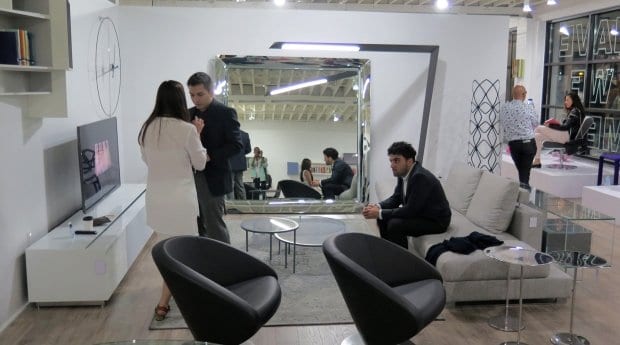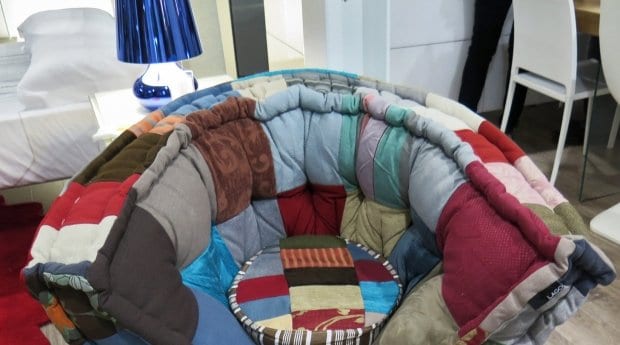
Inside Suite 22 Interiors. Credit: Rolyn Chambers

Karim Rashid Credit: Rolyn Chambers

The Laggo Huggy chair. Credit: Rolyn Chambers
With hungry eyes, women hover around handsome Karim Rashid, tonight’s special guest, as if he’s one of the Blowfish servers bringing us sushi during the gala opening of Suite 22 Interiors’ new downtown showroom. But it’s not fresh rolls they’re after; it’s an opportunity to have their picture taken with, as Time magazine called him in 2013, “the most famous industrial designer in all of the Americas.” As I jockey for his attention while devouring an enoki roll, he spies me, pulls me aside and whispers into my tape recorder, “Why aren’t the skinny girls flirting with me?” The last time I spoke with Rashid was at IIDEX last year. I know he’s happily married, so I assume he’s just joking.
Rashid, an award-winning designer with more than 3,000 items in production, is in a jovial mood after giving an informative speech on the passion for product design. The family-run business has operated a massive 15,000-square-foot showroom in Markham for the last eight years, and tonight they officially welcome industry insiders to their first downtown space. While most furniture stores today have chosen to takes pieces from collections all over the world, Suite 22 focuses exclusively on high-end, contemporary Italian designers from brands like Saba, Arketipo, Fiam and Bonaldo. Born in Cairo, Egypt, and raised in Toronto, Rashid is not Italian, but his design aesthetics have secured him the spotlight tonight. Beside his love of skinny girls, I want to know what else this international, jet-setting celebrity designer and lecturer — who has worked in more than 40 countries designing everything from hotel rooms to furniture to watches to shoes to water bottles — would love to do.
“There are many, many things,” he says. “Bicycles, a bar, hotels. A lot of really banal appliances. Like things we have around us all the time, like microwave ovens. I’ve done a few in the past. I’ve also done hotels in the past, but I want to do a hotel in every city of the world so that when I travel, I can stay in it. I would love to stay in a hotel that I’ve designed in Toronto, but no one has asked me to do one. Or even a restaurant. I left Toronto 22 years ago, and no one has ever offered me the opportunity to do either. And there are a lot of unimpressive hotels here.”
On the subject of banal appliances, I wonder if there is already too much stuff in the world?
“Oh absolutely,” Rashid says. “A lot of the stuff that we have in the world is awful. The majority of the things that we live with don’t really work and they’re kinda kitsch. Even the automotive industry. You could argue that 90 percent of the cars out there are awful. I think the world can always improve. But more and more it’s getting better. The problem with Canada that never made sense to me was that we have all these natural resources, yet we never produced anything. We just sell it. It was always weird to me as kid to see all this iron ore, and we would send it across the lake and it would come back as cars. Why didn’t Canada make a car?”
Perhaps because we don’t have the population to support such ventures, I argue.
“But if Canada was a politically closed country like Russia or Yugoslavia, then you’d have to be productive in that way,” he counters. “You’d have to buy your stove or your car from [the country you lived in]. But because we are an open society and we have America right next door making everything for us, we never needed to.”
And America was once the world’s China.
“It’s never too late though,” Rashid says. “What’s happening with the world is that, because of technology and robotics, it’s becoming decentralized again. Things that are being made in China can now be made in Toronto. What China had over us was an abundant, cheap labour force. But now with technology creating cheaper machines that can do this work, these machines can be built anywhere, and the only cost will be that of the electricity to run these machines. You don’t really need hand labour anymore. The world is going to change.”
Hopefully with hard labour (yet again) being eliminated, the cost of some designer goods will come down, because many of the gorgeous home furnishings in this showroom — including my favourite piece, the twin Lago Huggy chair/bed ($2,900) — are slightly out of my league. At least the sushi’s free.
Suite 22 Interiors, 429 Richmond St E
suite22.ca


 Why you can trust Xtra
Why you can trust Xtra


